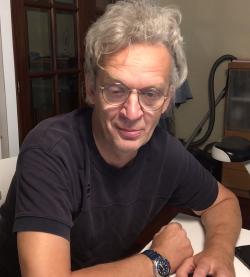You are here :
Published on September 14, 2022– Updated on April 30, 2023
Dmitri SOKOLOVSKI

University of the Basque Country, Spain
Visiting Scholar invited by research center LPTM
Stays from 13th November to 4th December, 2022
Curriculum Vitae
Dynamics of quantum measurements
The purpose of the visit is to continue collaboration with Prof. A. Matztin, started during my visit to 2019, clarify some of the current issues, and set the agenda for future work.
The general framework relying on the Feynman’s rules gives us the possibility to analyse a wide variety of quantum measurements situations. We, therefore, plan: To continue apllying the analysis of [1]- [3] (see Refs. list below) to the currently discussed problem of the extended Wigner’s friend scenario (EWFS) [D. Frauchiger and R. Renner, Nature Comm. 9 3711 (2018), C. Brukner, En- tropy 20, 350 (2018), K.-W. Bong, A. Utreras-Alarco ́ n, F. Ghafari, Y.-C. Liang, N. Tischler, E. G. Cavalcanti, G. J. Pryde, and H. M. Wiseman, Nature Phys. 16, 1199 (2020)]. (At stake are such issues as the internal consistency of quantum mechanics, and the existence of observer-dependent facts). To study the ways to identify incompatibility of statistical ensembles, produced by different sets of measurements. To continue with the analysis of Bell-like inequalities, identifying the cases where simpler approaches can be used instead.
We will also look for an extension of the currently used Feynman’s framework to the relativistic aspects of the quantum measurement theory [see, for example A.Peres, Relativistic quantum measurements (1999)]. We will also continue to investigate a closely related subject (see [3]) of ”weak” quantum measurements, purporting to yield information about interfering alternatives without destroying the interference . To analyse in detail various applications and practical realisations of the WM theory. Notably, its application to quantum retrodiction and, in particular, to the reconstruction of a quantum particle’s past. To investigate, in detail, the relation between the WMs and Bohm’s version of nonrelativistic quantum mechanics, in view of recent experiments, in which Bohmian trajectories have been reconstructed [Kocsis et al, Science 332, 1170, (2011)].
This brings us to the old problema of tunnelling time, currently under (renewed) investigation wing to the success of atto-second laser experiments. In Feynman’s framework tunnelling is an interference process. Therefore the uncertainty principle would not allow one to determine its duration in a classical sense. Our future plans are as follows.
We intend to extend the above description to time parameters, represented by various functionals, and study their measureability. We will continue to investigate various propositions to define the tunnelling time, and see if they fit within the concept, outlined above.
In particular, we will focus on Bohmian times, which arise directly from the Bohmian trajectories, and evaluate their relevance. We will continue to be interested in relativistic oneparticle theories, based on Klein-Gordon and Dirac equations (see [4] and [5]).
Projet
Visiting Scholar invited by research center LPTM
Stays from 13th November to 4th December, 2022
Curriculum Vitae
Dynamics of quantum measurements
The purpose of the visit is to continue collaboration with Prof. A. Matztin, started during my visit to 2019, clarify some of the current issues, and set the agenda for future work.
The general framework relying on the Feynman’s rules gives us the possibility to analyse a wide variety of quantum measurements situations. We, therefore, plan: To continue apllying the analysis of [1]- [3] (see Refs. list below) to the currently discussed problem of the extended Wigner’s friend scenario (EWFS) [D. Frauchiger and R. Renner, Nature Comm. 9 3711 (2018), C. Brukner, En- tropy 20, 350 (2018), K.-W. Bong, A. Utreras-Alarco ́ n, F. Ghafari, Y.-C. Liang, N. Tischler, E. G. Cavalcanti, G. J. Pryde, and H. M. Wiseman, Nature Phys. 16, 1199 (2020)]. (At stake are such issues as the internal consistency of quantum mechanics, and the existence of observer-dependent facts). To study the ways to identify incompatibility of statistical ensembles, produced by different sets of measurements. To continue with the analysis of Bell-like inequalities, identifying the cases where simpler approaches can be used instead.
We will also look for an extension of the currently used Feynman’s framework to the relativistic aspects of the quantum measurement theory [see, for example A.Peres, Relativistic quantum measurements (1999)]. We will also continue to investigate a closely related subject (see [3]) of ”weak” quantum measurements, purporting to yield information about interfering alternatives without destroying the interference . To analyse in detail various applications and practical realisations of the WM theory. Notably, its application to quantum retrodiction and, in particular, to the reconstruction of a quantum particle’s past. To investigate, in detail, the relation between the WMs and Bohm’s version of nonrelativistic quantum mechanics, in view of recent experiments, in which Bohmian trajectories have been reconstructed [Kocsis et al, Science 332, 1170, (2011)].
This brings us to the old problema of tunnelling time, currently under (renewed) investigation wing to the success of atto-second laser experiments. In Feynman’s framework tunnelling is an interference process. Therefore the uncertainty principle would not allow one to determine its duration in a classical sense. Our future plans are as follows.
We intend to extend the above description to time parameters, represented by various functionals, and study their measureability. We will continue to investigate various propositions to define the tunnelling time, and see if they fit within the concept, outlined above.
In particular, we will focus on Bohmian times, which arise directly from the Bohmian trajectories, and evaluate their relevance. We will continue to be interested in relativistic oneparticle theories, based on Klein-Gordon and Dirac equations (see [4] and [5]).
Projet


